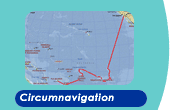June
24, 2001
San
Diego, California
Re-entry.
By Lois Joy  
“There
is nothing like returning to a place that remains unchanged to find
the way in which you yourself has altered.”
Nelson Mandela
We have been landlubbers now for one week. Landfall has been
both exhilarating and overwhelming. We are proud of what we accomplished,
succeeding in our maiden voyage by bringing Pacific Bliss back
from France to California. But our exhilaration has been drowned
in the overwhelming adjustment to life on land. Today, in desperation,
we promised each other a day of no engagements, no plans, no rushing
about. We allowed ourselves a morning of quiet reflection, contemplation,
and walking on the beach. Now, we feel centered again and able
to cope with this new life.
The first few nights, I woke up to feel the entire condo building swaying
as I found my way to the bathroom. Gunter automatically reached for
furniture as he walked, continuing to do the catwalk.
Our first group conversation with landlubbers was amazing: One person
would ask a question, then another would interrupt before Gunter or
I completed our reply. Often the questioner would even interrupt
the reply to her own question! No stories or thoughts came to a conclusion.
It was as if conversation now takes place as sound bites, mimicking
the TV that now grates on our nerves.
We found life on land very complex and disjointed. Everyone appears
to be rushing about doing nothing, but feeling very important because
they are very busy. Even their telephone conversations consist
of telling us why they cannot talk very long, explaining how busy they
have been in the last 24 hours and how busy they will be in the next
24. No one is living in the present.
Much time on land is spent planning the next day, the next week, the
next month and the next year. Reluctantly, our Daytimers came back out.
We could not keep all these plans in our heads anymore. We began to
partition our lives into time bits again. On Pacific Bliss, only
the time of the day was important, but the date or the day of the week
didn’t really matter. We had a decorative wall calendar that provided
the dates for all of 2001; it was made of bamboo, not the type you could
write on. What mattered on Pacific Bliss were state of the winds
and the sea, the distance to the next safe port or anchorage, and how
one planned to get there. Our brass ship’s clock was always
set on local time. The clock at the nav station was set on Zulu
(Universal) time. An alarm reminded us of our morning SSB
nets, or when we needed to set up the computer to receive the weather
fax. Life was simple.
My first day behind the wheel after nine months was another distressing
experience. I cautiously pulled out of our underground parking
garage to face the traffic on Riviera Drive. I knew better than to attempt
a left turn out into the busy street, although that was the direction
I was headed. I waited and waited for the cars to quit coming
by so that I could pull out to make a right turn. Finally, I
realized that I would need to be aggressive if I did not want to remain
there forever. On Pacific Bliss, you see, the person on
watch would have an easy one-half hour after first spotting another
vessel to track it and decide whether one needed to change course.
Life was slow.
Life on land, at least in a large population center such as San Diego,
brings with it the concurrent congestion, traffic and rage of the inhabitants.
During our first week we encountered road rage twice. There
is little patience and no giving among drivers here. And there appears
to be an inner sense of anger or entrapment that comes out at the least
provocation. Among cruisers, of course, no one feels trapped
or hemmed in. We have the whole wide world to live in, with the
seven seas as our highway! Any remaining inner anger was vented long
ago during the last fierce storm. Life was mellow.
We realized today that, on land, we need to seek out stillness and
peace. It will not come to us as it did on the ocean, carried
on the wings of glorious dawns and majestic night skies.
At sea, it was easy to “be still and know that I am God.” But
answers still come to those who seek. This morning, my answer came in
Ecclesiastes 8:1: “How wonderful to be wise, to understand things,
to be able to analyze them and interpret them. Wisdom lights up
a man’s face, softening its hardness.”
As I flipped back to the beginning of this book authored by Solomon,
King David’s prosperous and wise son, I was amazed at all the references
to “chasing the wind” in the first few chapters of Ecclesiastes
(italics mine), and how God gives wisdom, knowledge and joy:
Generations come and go but it makes
no difference. The sun rises and sets and hurries around to rise
again. The wind blows south and north, here and there, twisting
back and forth, getting nowhere. The rivers run into the sea but the
sea is never full, and the water returns again to the rivers, and flows
again into the sea….everything is unutterably weary and tiresome.
No matter how much we see, we are never satisfied; no matter how much
we hear, we are not content.
History merely repeats itself. Nothing
is truly new; it has all been done or said before. What can you point
at that is new? How do you know it didn’t exist long ages ago? We don’t
remember what happened in those former times, and in the future generations
no one will remember what we have done back here.
I, the preacher, was King of Israel,
living in Jerusalem. And I applied myself to search for understanding
about everything in the universe. I discovered that the lot of man,
which God dealt to him, is not a happy one. It is all foolishness,
chasing the wind. For the more my wisdom, the more my grief;
to increase knowledge only increases distress.
I said to myself, “Come now,
be merry; enjoy yourself to the full.” But I found that this, too, was
futile. For it is silly to be laughing all the time; what good
does it do?
So, after a lot of thinking, I decided
to try the road of drink, while still holding steadily to my course
of seeking wisdom.
Next, I changed my course again and
followed the path of folly, so that I could experience the only happiness
most men have throughout their lives.
Then I tried fulfillment by inaugurating
a great public works program: homes, vineyards, gardens, parks and orchards
for myself, and reservoirs to hold the water to irrigate my plantations.
Next, I bought slaves, both men and
women, and others were born within my household. I also bred great herds
and flocks, more than any of the kings before me. I collected
silver and gold from many kings and provinces.
In the cultural arts, I organized
men’s and women’s choirs and orchestras.
And then, there were my many beautiful
concubines.
So I became greater than any of the
kings in Jerusalem before me, and with it I remained clear-eyed, so
that I could evaluate all these things. Anything I wanted, I took,
and did not restrain myself from any joy. I even found pleasure
in hard work. This pleasure was, indeed, my only reward for all my labors.
But as I looked at everything I had
tried, it was all so useless, a chasing of the wind, and there
was nothing really worthwhile anywhere.
Now I began a study of the comparative
virtues of wisdom and folly, and anyone else would come to the same
conclusion I did-that wisdom is of more value than foolishness, just
as light is better than darkness; for the wise man sees and the fool
is blind. And yet I noticed that there was one thing that happened
to wise and foolish alike-just as the fool will die, so will I. So,
of what value is all my wisdom? Then I realized that even wisdom
is futile. For the wise and the fool both die, and in the days to come,
both will be long forgotten. So now I hate life because it is all so
irrational; all is foolishness, chasing the wind.
And I am disgusted about this, that
I must leave all the fruits of my hard work to others. And who can tell
whether my son will be a wise man or a fool? And yet all I have
will be given to him-how discouraging!
So I turned in despair from hard
work as the answer to my search for satisfaction. For though I spend
my life searching for wisdom, knowledge and skill, I must leave it all
to someone who hasn’t done a day’s work in his life; in inherits all
my efforts, free of charge. This is not only foolish; it is unfair.
So what does a man get for all his hard work? Days full of sorrow and
grief, and restless, bitter nights. It is all utterly ridiculous…
…Then I noticed that the basic motive
for success is the driving force of envy and jealousy! But this, too,
is foolishness, chasing in the wind.
So I decided there is nothing better
for a man to do than to enjoy his food and drink, and his job.
Then I realized that even this pleasure is from the hand of God. For
who can eat or enjoy apart from Him? For God gives those who please
him wisdom, knowledge, and joy….
…Everything is appropriate in its
own time. But though God has implanted eternity in the hearts
of men, even so, man cannot see the whole scope of God’s work from beginning
to end.
So I conclude that, first, there
is nothing better for a man to be happy and to enjoy himself as long
as he can; and second, that he should eat and drink and enjoy the fruits
of his labors, for these are gifts from God.
Selected passages from Ecclesiastes 1-4,
The Living Bible translation.
|











